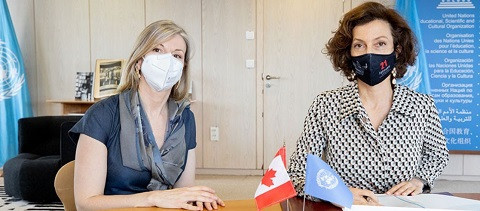
GCED Basic Search Form
Quick Search
You are here
News

Countries around the world are still shaped by their violent histories, which put them at higher risk of future conflict and genocide. Highlighting the importance of education and dialogue, Canada is supporting UNESCO with a grant of 2 million Canadian dollars to strengthen the capacities of education stakeholders, dialogue practitioners and policymakers worldwide to address violent pasts and to prevent mass atrocities in the future.
The programme ‘Preventing genocide through education – coming to terms with violent pasts’ is being implemented by UNESCO’s Education Sector in cooperation with the United States Holocaust Memorial Museum. In addition to guidance and training on Holocaust and genocide education, the project will include research and advocacy on intercultural dialogue, implemented by UNESCO’s Social and Human Sciences Sector.
The grant arrangement was signed by UNESCO Director-General Audrey Azoulay in presence of the Canadian Ambassador and Permanent Delegate to UNESCO Natasha Cayer in a ceremony on 18 March. At the ceremony, Director-General Azoulay stressed the importance of education in coming to terms with violent pasts, and thanked Ambassador Cayer for Canada’s generous support. ‘Learning about violent pasts is more than acquiring historical knowledge. It is an effort towards building more secure and peaceful societies, as understanding the causes and consequences of targeted discrimination, persecution and mass atrocities is a fundamental step towards preventing them from reoccurring. It is a long-term investment towards the realization of human rights and genocide prevention. Thanks to Canada’s support, we will be able to build on past successes and expand our work in this area globally, together with our partners at the United States Holocaust Memorial Museum.”
Ambassador Cayer said: ‘Our youth must understand the past in order to help prevent atrocities from happening again in the future. Canada is firmly committed to the protection of human rights and the prevention of genocides, and believes the learning from history helps strengthen critical thinking and inoculates people against disinformation and the conspiracy theories used to dehumanize other people.’
The legacies of genocide and related trauma persist over generations. If left unaddressed, they can undermine social cohesion, fuel hate and incite violence. Education can be a powerful tool to raise awareness about these dynamics and favour dialogue, critical thinking, self-reflection and historical literacy, supporting conflict-transformation processes while also strengthening the resilience of learners to contemporary forms of discrimination and hate speech.
Holocaust education can be an important entry point. Learning about the history of the Holocaust can help to sensitize learners to the causes and consequences of genocide, prompt reflections about human right violations in their own countries’ histories and address related vulnerabilities.
With the support of Canada, UNESCO and the United States Holocaust Memorial Museum will launch a multi-year international capacity-building programme to present countries in all regions of the world with sustainable, context-relevant educational programmes in support of addressing violent pasts and preventing genocide that favour intercultural dialogue and include gender responsive measures. At its core, the programme plans a one-week international training workshop for ten country teams, which will be supported in the development and implementation of their own educational initiatives assisted also by the development of a policy guide and e-learning course on addressing violent pasts through education. Furthermore, a pioneering research effort into how processes of intercultural dialogue can be rendered more effective for peacebuilding objectives, undertaken by UNESCO’s Social and Human Sciences Sector and the Institute for Economics and Peace, will provide crosscutting guidance to the project’s activities.
The project builds on two international capacity-building programmes in 2015 and 2017 that were also supported by Canada. In the ‘International Conference for Education and the Holocaust’ (ICEH), UNESCO and the U.S. Holocaust Memorial Museum trained education stakeholders from 17 countries worldwide. The programmes gave rise to 16 country-specific educational initiatives that collectively reached over 4,600 learners and educators. The forthcoming training programme will bring together participants from countries previously involved as well as those that have not yet participated.
UNESCO promotes education about the Holocaust and genocide as part of the Organization’s programme on Global Citizenship Education (GCED), a priority of the Education 2030 Agenda. In this context, UNESCO supports education stakeholders to help learners to become critical thinkers, responsible and active global citizens who value human dignity and respect for all, and to reject antisemitism, racism and other forms of prejudice that can lead to violence and genocide. Learn more
Learn more about UNESCO’s work to make dialogue processes more effective for peace, cohesion, and resilience here.
URL:
